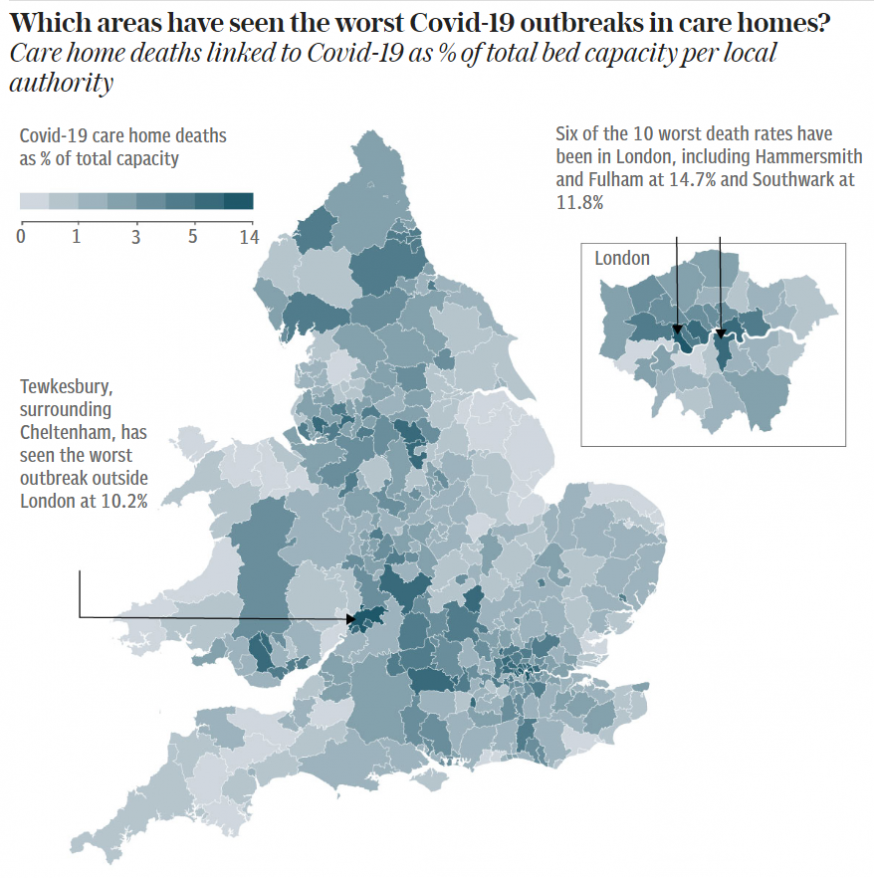
| 27 May 2020
The regulator has, like many others, had to adapt their approach around the challenges that come with a pandemic, however, along with their launch of the Emergency Support Framework, the CQC has received some backlash over their role in care homes during the crisis.
Care Quality Commission (CQC) is the independent regulator of all social care services in England. Their role is to ensure care services are safe, caring, effective, responsive and well-led. One aspect of this is the regular inspection of care homes (in England) to make sure they meet fundamental standards of quality and safety.
In March, CQC announced that it was stopping all routine inspections so as not to over-burden care homes during the COVID-19 epidemic. However, In order for CQC to continue with their regulatory role (i.e. ensure residents are receiving a safe, effective and compassionate service) they need to be aware of the unique challenges that care providers are facing and be readily available for support where needed.
An adapted approach for a demanding period
In an exclusive for Home Care Insight, Kate Terroni, CQC Chief Inspector, stated that, in response to the current pandemic, the commission has gone outside their usual role; implying that they had gone extra lengths to propel the sector through what is undoubtedly a period of unprecedented pressure on the care system and quite possibly the biggest blow to the sector in a generation.
She expands on this, stating that they provided “administrative support to the Department of Health and Social Care, facilitating test bookings for more than 25,000 staff” before longer-term delivery was taken on by the NHS. She adds that they had listened to the demands of those in care homes to identify where shortages of PPE were most prominent and “helped contact local authorities to get supplies to the frontline”, claiming that in critical cases, where a facility was running dangerously low, they arranged for loans of PPE from nearby care homes.
The Care Quality Commission has also been working with the Office for National Statistics (ONS) to deliver weekly updates on deaths in care homes, such as the one below.
“We want to be open and transparent in the way we work and help providers and the public have the clearest picture of what is going on in the sector.”
– Kate Terroni, CQC

Despite this, industry leaders have expressed “disappointment” with the role of CQC in care homes during the COVID-19 crisis.
Should providers have to pay their CQC fees during a crisis?
The fundamental motivator for the CQC, and any quality commission or assurer for that matter, is to work with providers, not against them. Nevertheless, according to the Telegraph, care workers are not satisfied with the regulator when it was needed most.
The CQC charges up to £16,096 in registration fees per year depending on the size of the care home. Already significantly cash-strapped and frustrated with the lack of resources and guidance offered by the government (before the crisis, and far more so after), registrees are questioning whether should pay up this year at all.
Last month, Judy Downey, chair of The Relatives & Residents Association (R&RA) (now Care Rights UK) wrote to the CQC’s chief executive Ian Trenholm saying there had been a “lack of oversight and scrutiny” of care homes during the crisis and that many residents had felt “totally abandoned” when the commission suspended it’s care home inspections.
Others have been more overt with their disillusionment. Chairman of the National Care Association, Nadra Ahmed, accused the body of “failing to engage” over deaths in care homes, adding: “they have been AWOL during this period”. Both Ahmed and Professor Martin Green, Chief Executive of Care England report that they have contacted the watchdog with their concerns, one stating that they had “steadfastly refused to respond” and the other remarking that calls to waive or suspend registration fees for the year were “refused point-blank on each occasion”.
Both conveners share the stance that, if the commission isn’t carrying out its main duties, namely inspections, why should providers be prepared to pay them for a service they are not or cannot provide. They also noted that the quango will have received “notable concessions from others (government bodies) to uphold the sector”.
“Lots of things have come out of this pandemic and one of them is that a lot of these quangos are not fit for purpose.”
– Professor Martin Green, Care England
However, CQC leadership insist they are fulfilling their role in other ways, working behind the scenes in the public interest. Ian Trenholm, CQC Chief Executive, maintains that the organisation are continually responding to whistle-blowers and where they see evidence of “risk of harm, deliberate abuse, systematic neglect or a significant breakdown in leadership”. Unfortunately, this response may not have been far-reaching enough.
Just the same, another spokesperson has stresses their “main aim is to help carers through an exceptionally difficult period” and that the Emergency Support Framework (a new system set up by CQC to aid care homes through the virus, see below) is “keeping people safe”. She also assured that providers that receive an incorrect invoice (due to a temporary change in registration status) will receive the necessary credit or refund, however, this does not apply to the aforementioned examples of registrees that believe the fee was simply not earned this year.
Perhaps a more reassuring statement was made subsequently:
“We recognise that providers may find themselves in additional financial difficulty during this period, we will be asking them to contact us if this is the case and will work constructively with them to find an appropriate solution.”
– CQC
The Emergency Support Framework
CQC announced their structured response to COVID-19 and the challenges it posed for the sector in May – the Emergency Support Framework. The watchdog stated that it wants to have “open and honest conversations with providers, healthcare staff, partners and local authorities to explore ongoing challenges, resolve issues and mitigate safety risks.”
The information gathered will help the regulator identify which practices may need extra guidance during the pandemic to resolve any identified issues and address tough decisions.
“A valuable assessment of how individual care services are coping with the virus and the associated issues”
– CQC
CQC stresses that “the framework is not an inspection, and we are not rating care services’ performance.” The calls will not be audio recorded; a PDF ‘summary record’ of the conversation will be sent to the recipient but will not be published on the CQC website.
Not all adult care homes will be contacted. Practices will be risk assessed and those with a higher risk will be called. CQC states that “If the inspector is confident that there is a lower risk level, they can decide not to call you, but they will be available to offer you guidance during this difficult period and we encourage you to call them if you would like advice.”
“We want to intervene whenever we see a significant risk rather than set an arbitrary limit – we will be guided by the intelligence we are gathering.”
– CQC
It’s expected that CQC will assess services by considering a number of factors including:
- What information CQC has or has been alerted to regarding the provider
- Whether CQC has been contacted about any specific concerns
- What the history of the provider has with CQC
The framework will be rolled out sector by sector from May 4th 2020, starting with adult social care.
Open and honest conversations
Following the risk-assessment CQC will contact relevant care homes to arrange a time for the call – calls will be made using Microsoft Teams. It’s hoped that both carers and CQC will benefit from these discussions, which will be centred around the following subjects:
- Safe care and treatment
- Staffing arrangements
- Protection from abuse
- Assurance processes, monitoring, and risk management
The inspector will take notes around the four key areas, which will be used to help judge whether the service is ‘managing’, ‘needs support’, or possibly needs further intervention where more serious issues are cited. The latter will mean focused inspections for hospitals and primary medical services and targeted inspections for adult care homes, as happens normally. “We may receive information, either from an external source or through our conversation, that results in serious concerns about actual or possible avoidable significant harm, abuse, or breaches of human rights.
“In which case, we will assess the risks involved and decide to either provide additional sources of support, arrange a follow-up call [or] use inspection and enforcement processes.”
– CQC
CQC will be reporting on the number of inspections conducted at their public board meetings. Nevertheless, whilst a stronger dialogue from higher up is critical, sector leaders are still concerned that the adapted approach isn’t disruptive enough.
“The CQC has sat on its hands for a long time and then produced a framework which only amounts to back watching for them.”
– Professor Martin Green, Care England
When asked when it expects to resume more regular inspections, the regulator revealed that a longer-term recovery plan is in development and that a large part of it will be informed by their “regular engagement with providers across all sectors and what they are telling us about care delivery on the ground.”
eLearning for healthcare
Unlock your potential – our healthcare eLearning courses make it simple to access high quality content, that deliver on your statutory and mandatory training and compliance needs.
